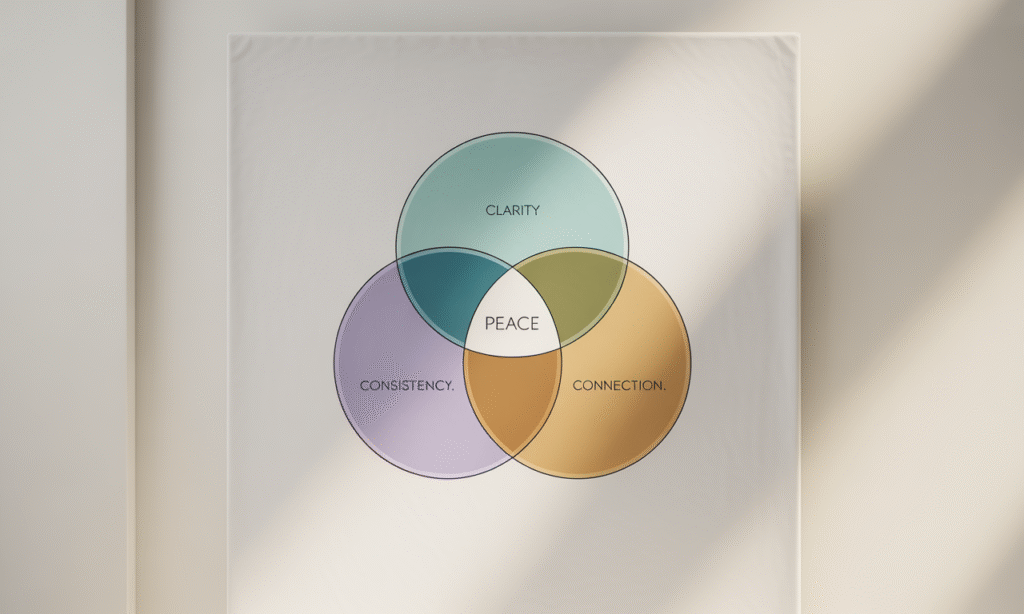Whose Rules Win? Re-Centering Parental Authority When Lines Get Blurry

Grandparents matter—but parents are the ones called to set the culture of the home. When a well-meaning grandparent rewrites your rules (“Just a little secret dating app,” “We skip church here”), kindly re-center authority without creating a power struggle. This piece shows you how to state the principle, not just the preference; how to use “Because we’re the parents, we’re choosing…” language; and how to invite supportive grandparents into a meaningful role that honors their influence while protecting your kids’ formation.
Why Parental Authority Matters More Than Perfect Agreement
 Every healthy family needs structure. Without it, children end up navigating mixed messages—one set of rules at home, another at Grandma’s. Grandparents often mean well; they want to pass on love, fun, and flexibility. But when authority becomes blurry, kids stop knowing which voice anchors them.
Every healthy family needs structure. Without it, children end up navigating mixed messages—one set of rules at home, another at Grandma’s. Grandparents often mean well; they want to pass on love, fun, and flexibility. But when authority becomes blurry, kids stop knowing which voice anchors them.
Re-centering parental authority isn’t about ego or control. It’s about stewardship. Parents aren’t dictators; they’re designers of a home culture—values, rhythms, and beliefs that guide the next generation. When grandparents sidestep that leadership, even unintentionally, it undermines consistency and confuses identity.
You can affirm their heart while clarifying your leadership:
“You’ve built so much love into this family. Because we’re the parents, we’re choosing a few boundaries that help us protect that same love for the kids.”
The cornerstone post, The Grandparent Boundary Playbook: Protecting Your Parenting Without Blowing Up the Family, outlines this foundational concept: parents lead, grandparents support. Once that structure is respected, everyone can relax back into their rightful role.
The Myth of “Equal Voices” in Parenting
 Many modern families fall into the trap of trying to make everyone’s opinion count equally—parents, grandparents, siblings, even friends. It sounds diplomatic, but it creates chaos.
Many modern families fall into the trap of trying to make everyone’s opinion count equally—parents, grandparents, siblings, even friends. It sounds diplomatic, but it creates chaos.
Children need one clear compass. In God’s design and in practical psychology, that compass is the parent.
When a grandparent says, “But I raised you fine, so I know what works,” you can respond gently:
“You really did. And we’re continuing that legacy by leading the same way—with clarity. We may do some things differently, but the goal is still the same: raising kind, wise, faith-filled kids.”
This reframes authority not as opposition but as continuation. You’re not rejecting their wisdom; you’re evolving it to fit your context.
When “Just This Once” Becomes a Pattern
 Most authority erosion doesn’t happen in big confrontations—it happens in small exceptions. “Just one more cookie.” “Just one extra show.” “Just a little secret, don’t tell Mom.” These small cracks turn into culture shifts over time.
Most authority erosion doesn’t happen in big confrontations—it happens in small exceptions. “Just one more cookie.” “Just one extra show.” “Just a little secret, don’t tell Mom.” These small cracks turn into culture shifts over time.
Re-centering parental authority means noticing patterns early and addressing them calmly:
“We know you love spoiling them, but we’re trying to teach self-control. Because we’re the parents, we’re choosing to keep sweets for weekends. That helps them see boundaries as loving, not limiting.”
The more consistent your language, the less defensive your tone needs to be. You’re not arguing; you’re simply restating truth.
The Power of the Phrase “Because We’re the Parents…”
 It’s not a slogan—it’s a framework. The phrase “Because we’re the parents, we’re choosing…” does three vital things:
It’s not a slogan—it’s a framework. The phrase “Because we’re the parents, we’re choosing…” does three vital things:
- Centers authority on relationship, not rank.
- Connects the rule to a purpose (“so they learn patience,” “so bedtime stays calm”).
- Creates predictability, which grandparents can eventually trust.
Here are a few examples you can adapt:
- “Because we’re the parents, we’re choosing no sleepovers yet so they learn body safety.”
- “Because we’re the parents, we’re choosing one dessert so they learn moderation.”
- “Because we’re the parents, we’re choosing church on Sundays so they learn rhythms of faith.”
You’ll find many of these ready-to-use scripts in The Conversation Kit: Scripts for Respectful Boundary Talks with Grandparents, which helps you apply this framework gracefully in real-time situations.
Re-Centering Without Rebellion
 Some grandparents interpret your authority as rebellion against their own parenting. It’s important to honor history without surrendering leadership.
Some grandparents interpret your authority as rebellion against their own parenting. It’s important to honor history without surrendering leadership.
Try language that connects, not competes:
“You taught us how to love our family deeply. We’re doing the same thing in today’s context, just with some updated tools.”
You can also name their value explicitly:
“Your consistency and faith gave us a foundation we’re still building on. That’s why we want to keep the kids’ routines steady—it’s our way of continuing your legacy.”
Honoring the past gives you permission to lead in the present.
When Faith Practices Collide
 Nothing tests authority like religious differences. A grandparent’s new beliefs—or departure from old ones—can create invisible tension. You might be following Christian principles while they’re exploring other ideas.
Nothing tests authority like religious differences. A grandparent’s new beliefs—or departure from old ones—can create invisible tension. You might be following Christian principles while they’re exploring other ideas.
This isn’t about argument—it’s about alignment for your kids. You can say:
“We’re grateful for your love and curiosity. Because we’re the parents, we’re choosing to guide the kids’ spiritual learning for now, so everything stays consistent.”
You can then redirect: “They love when you read their children’s devotional—that would be a huge help.”
Redirect, don’t debate. It keeps relationship open without surrendering clarity.
The “Fun Grandparent” Trap
 Many authority breakdowns happen because one household becomes the “fun” zone and the other becomes the “rule” zone. That dynamic erodes respect and connection.
Many authority breakdowns happen because one household becomes the “fun” zone and the other becomes the “rule” zone. That dynamic erodes respect and connection.
The solution isn’t to make your home more lenient—it’s to make the grandparents’ environment more aligned. Share your family rhythm:
“They thrive on knowing what’s expected. Could we keep bedtime and snacks the same so they don’t crash when they come home? It really helps them enjoy your time more.”
Consistency doesn’t kill fun—it multiplies it. When kids know the rules, they can relax into relationship.
When Authority Is Challenged in Front of Kids
 Few moments feel as destabilizing as being undermined mid-sentence: “Oh, let them stay up, they’re fine!”
Few moments feel as destabilizing as being undermined mid-sentence: “Oh, let them stay up, they’re fine!”
Kids instantly sense divided authority. Handle it gently but firmly—without embarrassing anyone.
In the moment: redirect with calm humor:
“We’re going to keep the bedtime plan tonight—thanks for helping us stay on track!”
Afterward (privately):
“It helps the kids so much when we all say the same thing. I know it’s hard not to jump in—you love them so much. But keeping unity really keeps them calm.”
The key is private correction, public unity.
Giving Grandparents a “Yes” Role
 Re-centering parental authority doesn’t mean grandparents lose purpose. It means redirecting their energy into roles that support your culture:
Re-centering parental authority doesn’t mean grandparents lose purpose. It means redirecting their energy into roles that support your culture:
- The Tradition Keeper: leads family story time or teaches a recipe.
- The Memory Maker: handles a monthly “family photo day.”
- The Faith Ally: reads devotionals, prays with the kids.
- The Mentor: teaches a hobby like gardening, woodworking, or sewing.
Invite them into the mission, not out of it.
“We’d love your help teaching them how to bake your famous cookies—that’s a tradition we want them to treasure.”
You’re giving them dignity within your leadership, not outside it.
Language That Builds Bridges, Not Walls
 Tone makes or breaks a boundary conversation. Here are bridge-building sentence starters:
Tone makes or breaks a boundary conversation. Here are bridge-building sentence starters:
- “We’re grateful for how much you love them.”
- “We’re trying to stay consistent across all homes.”
- “You’re such a big part of their world.”
- “Here’s how you can help us make things peaceful.”
Notice that none of these start with “You always” or “You never.”
The goal is unity, not victory.
If you struggle to find calm phrasing in the moment, refer back to the full list of examples in The Conversation Kit.
Teaching Kids About Parental Authority
 Your children are watching every adult interaction. When you model steady leadership, they learn respect without fear.
Your children are watching every adult interaction. When you model steady leadership, they learn respect without fear.
You can explain boundaries in simple terms:
“Grandma loves you so much. We all follow the same house rules so everyone feels safe and rested.”
That short sentence teaches kids structure and gratitude simultaneously. They learn that authority isn’t about control—it’s about care.
When Your Partner Feels Torn
 Sometimes one spouse struggles more than the other with enforcing boundaries—especially if it’s their parent. It’s easy to slip into blame (“You need to tell your mom!”), but unity requires grace.
Sometimes one spouse struggles more than the other with enforcing boundaries—especially if it’s their parent. It’s easy to slip into blame (“You need to tell your mom!”), but unity requires grace.
Set a couple check-in routine before family visits:
- Agree on the top two non-negotiables.
- Rehearse short language for each.
- Debrief afterward: what worked, what drifted?
Even small unity signals—like finishing each other’s sentences calmly—show your kids and parents that leadership is shared.
When Authority Is Repeatedly Disrespected
 If a grandparent refuses to respect boundaries after calm talks, you may need to scale access. Follow the model from When They Won’t Respect the Boundary: Consequences, Repair, and a Path Back.
If a grandparent refuses to respect boundaries after calm talks, you may need to scale access. Follow the model from When They Won’t Respect the Boundary: Consequences, Repair, and a Path Back.
Start small—supervised visits, shorter durations, or structured activities—and pair every limitation with hope:
“We’re doing this so trust can rebuild. We want connection to grow again soon.”
This keeps the tone relational, not punitive.
When Respect Is Mutual, Everyone Wins
 Authority isn’t about power—it’s about peace. When grandparents trust your leadership, their influence multiplies instead of competes.
Authority isn’t about power—it’s about peace. When grandparents trust your leadership, their influence multiplies instead of competes.
They become allies, not obstacles. Kids feel secure. Visits stay joyful.
You don’t need everyone’s agreement to lead your home. You just need consistent clarity wrapped in warmth.
Summary: The Three C’s of Parental Authority
- Clarity: State your boundaries in one calm sentence.
- Consistency: Apply them across all homes.
- Connection: Keep the door open with gratitude and hope.
When those three stay in balance, everyone can breathe easier. The family dynamic shifts from power struggle to peaceful rhythm.



